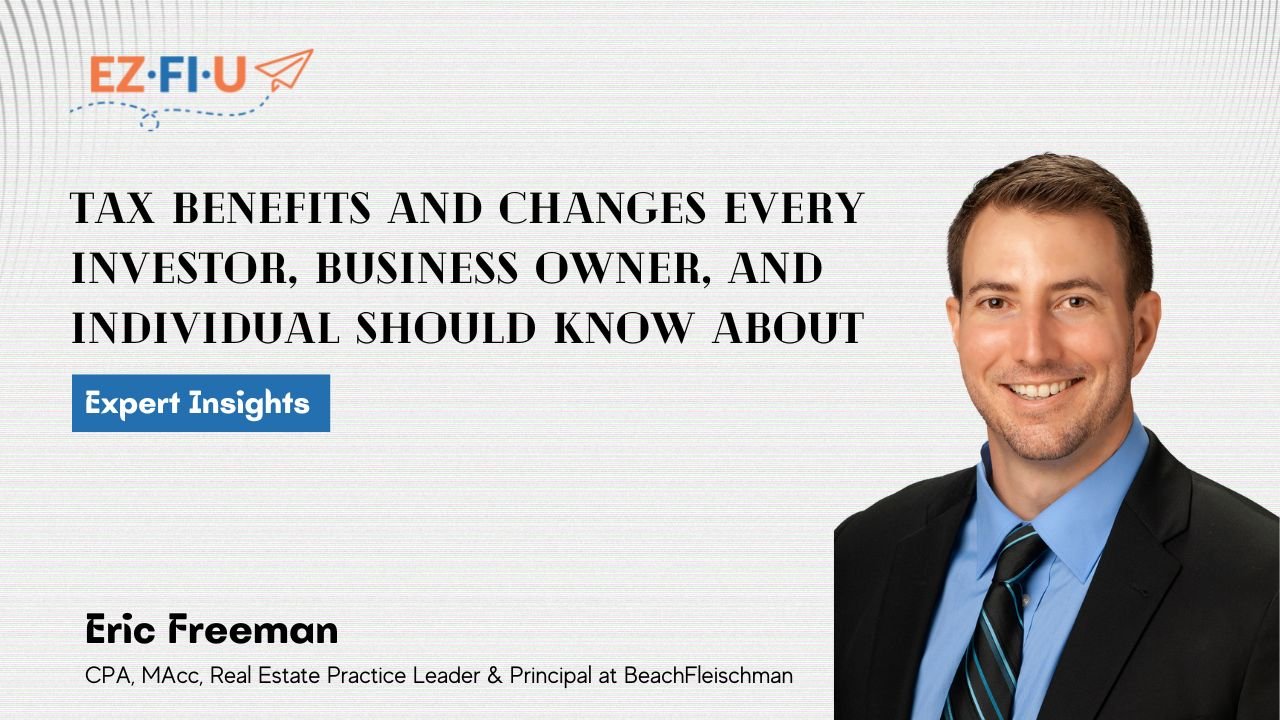Tax Benefits and Changes Every Investor, Business Owner, and Individual Should Know About
For many of us, taxes are the bane of our existence; They’re complicated, convoluted, and costly. At some point, it pays off to work with an experienced tax professional because you’re able to develop short and long term strategies that can save you a lot of headaches and money over time. It’s important as an individual to make sure you at least have some level of education and awareness about applicable tax laws so you can have informed conversations with your tax advisor and feel more confident about your personal strategy.
Tax awareness becomes even more important as your income increases, you branch into new investments and/or new business ventures. That’s why we love investing in real estate - there are several tax laws designed to give you a boost when you invest in this arena. That’s why we partnered with real estate and business focused CPA Eric Freeman on this article to share the top tax benefits and changes for 2023 that every investor and business owner needs to know about.
Eric Freeman, CPA, MAcc, is a practicing Certified Public Accountant with a top 200 accounting firm, BeachFleischman, PLLC. Eric is a Principal and the Real Estate Practice Leader. Eric’s focus as a CPA is partnership taxation and complex real estate transactions, including exchanges, mergers, consolidations, buy-outs, cost segregation studies, transaction formation and Qualified Opportunity Zone Funds. He has a successful series of YouTube videos with his friend and client, Ken McElroy, which you can watch on Ken’s channel. With over a decade of experience, Eric offers a unique perspective to real estate taxation from his own experiences of owning and managing real estate investments.
Now, let’s dive into the top tax benefits and changes that everyone who invests should know about, but potentially doesn’t. We’ll start with the upcoming changes for next year and beyond.
Watch a preview of our recent interview with Eric on upcoming changes for the 2023 tax year that he believes every investor should know
Bonus Depreciation
Physical assets depreciate over time, meaning their value decreases at a certain rate after being purchased. You may not be able to physically see the changes, but according to the government, every asset has a lifespan and therefore loses value as it gets closer to the end of that period. Large assets like real estate have a standard depreciation timeline. Real estate investors are able to write off or depreciate their property’s value and most improvements at a standard rate over 27.5 years (some improvements can be depreciated over a shorter period of time).
Bonus depreciation essentially accelerates the process for those capital improvements. In the past the tax code was written in a way that said you could write off 100% of value of certain components of the asset in the first year of ownership when you do a cost segregation study. The big change in 2023 is that this amount is going down to from 100% to 80%. It’s currently set that this amount will continue to step down over the course of the next few years. While 80 isn’t 100, real estate investors are still able to take advantage of bonus depreciation in 2023.
Inflation Reduction Act
This act was signed into law in August of 2022. According to The White House, this law “will lower costs for families, combat the climate crisis, reduce the deficit, and finally ask the largest corporations to pay their fair share.” It impacts both individuals and businesses. You can read more about the overall changes covered by this act on the White House website. Not everything under this act has gone into effect yet, but some have, like the tax credits for electric vehicles.
The main items that investors should be aware of are the changes to clean energy, some of which apply to both individuals and businesses. These include:
30% tax credit for installing solar. These credits were set to expire but have now been extended another 10 years out
Consumer rebates (tax credits) for installing energy efficient home appliances. If you’re planning on doing any upgrades to things like hot water tanks, ACs, heaters, etc. be sure to save the receipts as you may be eligible for increased credits going forward.
Tax credits for new and used electric vehicles (ranging from $7,500 to $4,000 depending on the vehicle)
💡 Pro CPA Tip: Document and keep records of all improvements and upgrades you make to any of your personal or investment properties. Be sure to provide this documentation to your CPA so it can be determined if you are eligible to claim these tax credits.
LLC Reporting
This technically doesn’t take effect until 2024, but if you own an LLC it’s something you should start preparing for next year. All domestic LLCs will need to do additional reporting to FINCEN (The Financial Crimes Enforcement Network), the government agency whose mission is to protect the US financial system.
It’s important because there are massive penalties for not filing reports on time. And yes, this applies to LLCs in all states including Wyoming and Delaware where you typically do not have to report ownership publicly. It still won’t be publicly published as far as we can tell but there is no exception to this rule based on the state in which your LLC was incorporated. This will have an impact on multifamily real estate syndicators especially as typically each property/deal is purchased under a new LLC.
💡 Pro CPA Tip: You do have to file a report for each LLC you are an owner of, so consider consolidating or reducing the number of LLCs you own where it makes sense to lessen the burden of this reporting.
Now, let’s focus on the existing tax laws that are available to investors and business owners, especially those in the real estate space.
Qualified Business Income Deduction
This was originally part of Trump’s tax plan back in 2018. It’s a flat 20% deduction off of your income from qualified businesses which reduces your overall tax liability, subject to certain limitations. This applies to pass through entities (including single member LLC’s, S-Corps, and Partnerships) or if you do any reporting on an individual tax return such as on the Schedule C for businesses or Schedule E for rental properties.
This is good news for real estate investors, specifically if you own rental properties like Airbnbs or long term rentals. The one caveat is that it does not apply to triple net leases, such as if you own a commercial property like a CVS, or you own a single family rental and the tenant does all the repairs and bills you back for this.
💡 Pro CPA Tip: If you’re going to do a rental property, consider structuring it to avoid the triple net lease setup so you can take advantage of this tax benefit. If you’re not sure what qualifies as a triple net lease, consult with your CPA and read more about the difference between single, double and triple net leases here.
Real Estate Professional Status
One of the most advantageous ways to reduce your taxable income is by being qualified with real estate professional status AND invest passively in real estate syndications. You can learn more about REPs status and how active investors can benefit from it tax-wise in our other blog.
Essentially, in order to qualify, you need to be working in real estate full time while investing passively to be able to offset all of your income by passive losses from your syndication investments. This can be working as a property manager, in construction, having a broker’s license, or by being an active owner of properties. The only way to take advantage of those passive losses generated from activities you aren’t materially involved in is to make an election and group them.
💡 Pro CPA Tip: Be sure to talk to your CPA to see if you qualify or what changes you can make to qualify in the future. If you already have this status and invest passively, document all of your passive investments and share this with your CPA so they can share how to make this election.
Cost Segregation Studies
These are paid studies conducted by qualified engineers on a specific property which allow you to depreciate certain parts of a property faster than others. Typically, if you own a residential property like your home, you can take the value of the property (not including the land) and divide it by 27.5 years and that is the amount you can deduct from depreciation each year.
A cost segregation study essentially categorizes the different components of the property into ones that will depreciate faster, such as carpets, cabinets, and countertops, and puts them into shorter buckets of depreciation times like 5, 10, or 15 years. Instead of looking at the property as a whole, it looks at the pieces and states which will not last as long and allows you to depreciate those quicker.
💡 Pro CPA Tip: If you own larger real estate properties like apartment buildings, it may make sense to pay for this study to be done on an investment property to speed up the timeframe in which you can write off portions of the property to reduce your tax bill. If you’re a passive investor, you can check with your syndication team to see if they have or are planning to do this kind of study as it can accelerate your passive losses and offset passive income.
As always, we recommend working with a CPA who has knowledge around the type of business and investments that you are involved in so they can help you take advantage of relevant tax strategies. Use these topics as a starting point to have a conversation with your current CPA about what is applicable to your situation and what kind of documentation they will need to maximize your tax savings next year.
For more tax related knowledge drops, follow Eric on Tiktok @ericfreemancpa, Facebook, and Instagram and check out our webinar where we answer investor’s questions about taxes related to real estate, business ownership, Airbnbs, depreciation, capital gains and much more.
Disclaimer: This is for educational purposes only. None of the content in this article should be construed as tax advice. You should contact your attorney, CPA or other legal professional for specific advice.


